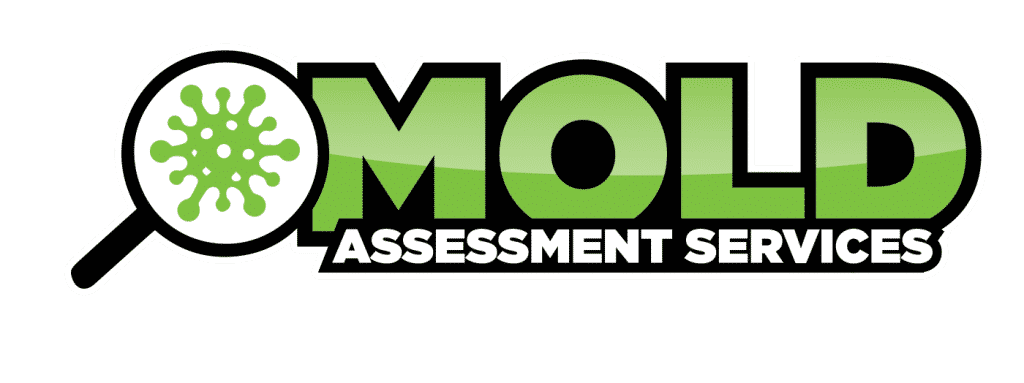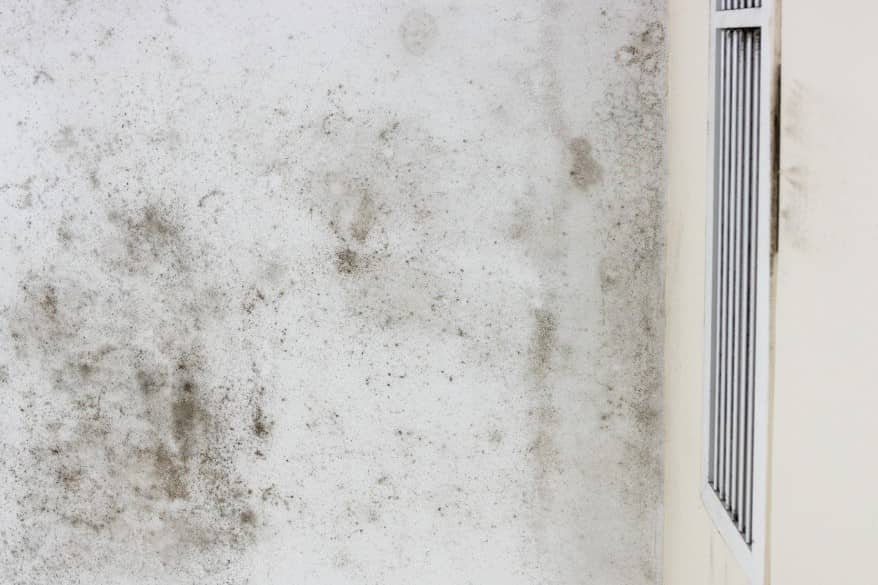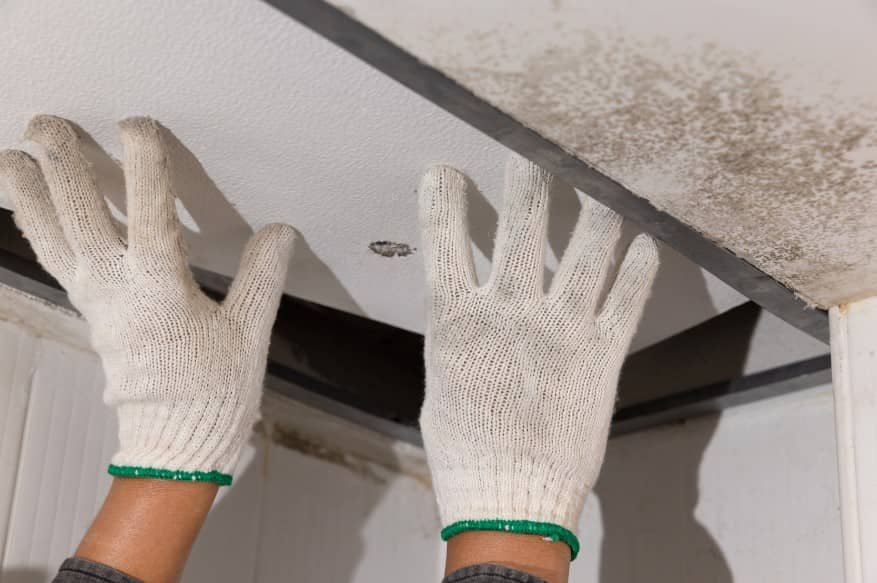What do I do about the Mold in my ac unit? If you live in South Florida, this is a common question asked to mold assessors. Mold is a fungus that can grow on almost anything, including the inside of your air conditioner. It is one of the most common indoor air pollutants and can cause a mold health hazard. The best way to check for household mold in your ac system is to call a professional like Mold Assessment Services in Florida for an inspection.
What is mold?
The typical signs include:
- Musty smells
- Discoloration or staining on walls and other surfaces
- Mold growth on ceilings or floors
- Fungus growth inside air conditioning units and heating systems
Homeowners can take steps to prevent or remove mold from their homes. However, if there is an extensive infestation, professional help may be necessary. A professional inspection will help determine if a problem exists with the HVAC systems and what needs to occur.

Household Mold Health Hazard in AC unit in Coral Gables, Florida home. Professional remediation services are essential for effective mold spore removal and improving environmental health. Mold detection through air quality testing and water damage assessment can prevent the spread of toxic mold exposure. HVAC cleaning and mold prevention tips play a crucial role in managing allergies and ensuring a safe living environment.
AC System Health Hazard: Toxic Mold
The role of hidden molds and other toxigenic organisms in our environment is underestimated by many. Most of us are unaware of the rate that our buildings are leaking or suspect it isn’t getting worse and doesn’t check for mold. However, recent research describes multiple studies reporting higher than expected symptoms in exposed individuals compared to unexposed controls.
In a comprehensive review published in 2004, Campbell and colleagues evaluated the research on the physiological effects of mold toxins. They reported symptoms of people living or working in water-damaged buildings compared with an unexposed control population. Additionally, they found that individuals may be exposed to hidden active mold, which is estimated to be as high as 50%.
Mold in your home can come from many different sources, including:
- Airborne spores that land on wet surfaces
- Condensation forming inside walls or pipes
- Water leaks and flooding
- Improperly functioning HVAC
The symptoms of mold exposure can vary depending on the type of mold you encounter and your sensitivity to it. People allergic to mold may experience asthma attacks and other respiratory problems, such as difficulty breathing or coughing.
Mold can cause a variety of health problems, including:
Allergic reactions
If you’re allergic to mold, touching or inhaling spores may lead to an allergic reaction. Symptoms include sneezing, a runny nose, and watery eyes.
Respiratory issues
Inhaling mold spores can lead to asthma attacks or shortness of breath.
Blood infections (Sepsis)
In rare cases, people with weakened immune systems exposed to high amounts of mold may develop sepsis. It is an infection in the bloodstream that can cause fever, chills, and other symptoms.

Is that Mold in My AC unit? Household Mold in AC unit in Coral Gables, Florida home. The health hazards of mold exposure, particularly from mold in air conditioning units, cannot be underestimated, especially in humid regions like South Florida. Mold Assessment Services in Florida offers professional mold inspection to identify and address these risks effectively.
AC System Health Hazard: What to Do About Mold in My AC System?
If you suspect that your air conditioner might have mold, the first thing to do is ensure that it is not a fire hazard. Turn off the power and open windows and doors so that fresh air can circulate through your home.
If you have a window-mounted AC unit, it should be simple to inspect for mold growth. Remove any debris around the unit and then use a flashlight to look inside. If you spot any signs of mold, such as black spots or fuzzy growths on ducts, consider calling professionals to remove the unit and clean up the area properly.
If you have a free-standing AC unit, it may be harder to inspect for signs of mold growth. You may need to disassemble parts of the machine (or hire someone else to do so) to get at areas where mold could be hiding out. If possible, try using a disinfectant spray or bleach solution on these surfaces. Wear protective gear if you suspect there may be live mold spores lurking inside your machine.

Mold found on a wall by Mold Assessment Services in Florida. Preventing mold growth in homes is crucial to maintain indoor air quality and protect residents from potential respiratory issues and allergic reactions to mold. Symptoms of mold exposure, including coughing, sneezing, and eye irritation, highlight the importance of timely intervention.
Are there different types of Household Molds?
There are different types of household molds that exist. Florida is known for its various molds that grow in a wet environment.
There are hundreds of different types of mold, but the most common ones in your home are blue-green and black. If you see green or black spots on your walls, ceiling, or floor, mold is likely present.
There are two main types of molds:
Allergenic Molds
Some molds can cause allergic reactions and health problems in people who are sensitive to them. Allergic reactions usually develop within 24 hours after exposure, according to the Mayo Clinic. Reactions include sneezing, watery eyes, nasal congestion, and skin rashes. Allergic reactions aren’t common unless exposed to large amounts of mold spores as an adult or child.
Pathogenic Molds
Some molds can cause infection when inhaled or ingested by people with weakened immune systems. Some include HIV/AIDS or cancer patients undergoing chemotherapy, according to the U.S. Centers for Disease Control and Prevention (CDC).
Most Common Household Molds in Your AC and Home
The most common types of household molds include:
Aspergillus Niger or Aspergillus Versicolor
These are two kinds of black mold that grow in humid areas with temperatures between 50 and 80 degrees Fahrenheit. They tend to be in older buildings with poor ventilation systems or where there has been a leaking pipe or roof problem.
Stachybotrys Chartarum
This mold is associated with respiratory symptoms such as wheezing and shortness of breath in infants exposed to it before birth or at an early age. These symptoms usually appear within a few months after exposure to Stachybotrys Chartarum spores. However, other factors may play a role in these symptoms as well.
Cladosporium Sphaerospermum
This mold grows on clothing, plants, and other organic materials. It’s in large amounts in bathrooms where humidity levels are very high because they need moisture to survive. Cladosporium Sphaerospermum is often growing on shower curtains and linens because of the water from a shower or bathtub.

There are various types of household mold, each with its own health implications. Allergic and pathogenic molds, for instance, can cause severe health problems, especially in individuals with weakened immune systems or mold allergies. Mold Assessment Services in Florida provides comprehensive mold remediation and testing services to identify these molds and eliminate them from your environment. By improving indoor air quality through professional inspection and remediation, homeowners can significantly reduce the risk of mold-related health issues and ensure a safer, healthier living space.
Should I Test My Home AC System for Mold?
Mold is a problem that can affect anyone. It can be hard to detect, and it’s not always easy to determine how much damage has been done by the mold spores.
But if you’re experiencing breathing problems or other symptoms, it’s good to test for mold. Here are some reasons why:
- Mold exposure can cause health problems. Mold spores are almost everywhere, but they only become a problem when they grow into colonies large enough to release toxins into the air. When this happens, people can experience respiratory issues and skin and eye irritation — even if they don’t live in a home with visible mold growth on walls or floors.
- Mold growth may hide behind walls or carpets, so it’s not always easy to detect without professional testing equipment. If you have a reason to suspect that there might be mold in your home — even if it doesn’t look like there is — then it’s a good idea to get tested for mold before it becomes an issue later on down the road.
- You might get exposed to mold at work or school. In addition to being found in residential buildings, mold grows naturally outdoors in areas with high humidity and rainfall levels, i.e., forests or wetlands.
An AC system health hazard can lead to the circulation of mold spores in your home, causing respiratory issues and allergic reactions, making it essential to ensure your system is mold-free to maintain a healthy indoor environment. may be causing damage to your home or belongings. If you notice water stains on walls or the ceilings or discoloration on fabrics, it could mean that there’s enough moisture in your home for mold growth.
Mold Assessment Services Can Verify your AC System is Mold Free!
Mold is a problem that can affect any home, but it’s difficult to detect and even more to remove. Your AC system health hazard can significantly impact indoor air quality, leading to potential respiratory issues and allergic reactions due to mold and pollutants. If you have mold, contact a reputable company to have your home tested and remediated. Get in touch with Mold Assessment Services for a professional assessment of your home.
Mold Assessment Services offers a variety of services related to mold remediation, including:
- Mold inspection: We’ll come to your house and perform an inspection to test if mold is present and determine the type.
- Water damage assessment: If there is water damage to your home, we assess the extent of the damage and provide recommendations on how best to clean up the mess before it gets worse.
- Indoor air quality testing: We can test the air quality inside your home for things like dust mites, pet dander, and other allergens that may be causing you discomfort.
Contacting Mold Assessment Services will ensure that you have spoken with an experienced professional who knows how best to remediate the situation.


